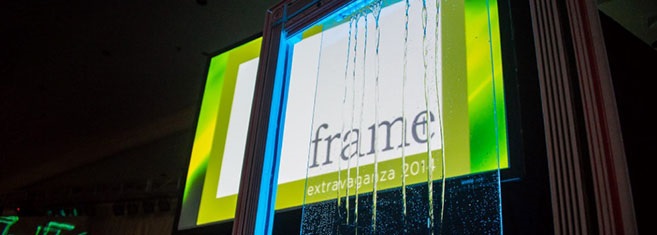Scanning the crowd milling around tables where Lutheran ministries from across the country were representing themselves with free pens, colorful brochures and candy, I looked for familiar faces in the sea of Lutheran youth workers gathering for opening worship. I found friends from seminary, from Young Adults in Global Mission, and from Lutheran camps, friends who are now also colleagues in ministry to youth and young adults.
In January, I joined over 670 ELCA youth workers in St. Louis for a four-day conference simply called the “Extravaganza.” The ELCA Youth Ministry Network (an independent organization that works alongside the ELCA) has held the Extravaganza annually for 18 years. The theme this year was “Frame,” which guided conversation for those four days, but also describes the impact the Extravaganza has had on my own ministry and on youth ministry in the ELCA.
This year, Martin Luther’s classic questions “What is this?” and “What does this mean?” undergirded rich conversations about ministry, discipleship and the church. Taken literally, “framing” is a process that defines, contains and preserves an object, fitting it into a neat box that provides comfortable boundaries to the observer.
The “frame” work undertaken at the Extravaganza took models of children’s, youth and young adult ministry long memorialized in a declining church off the wall to examine them. Applying Luther’s simple questions to aspects of ministry, which are often taken for granted or avoided, led us quickly into deep reflection. What is discipleship? What is forgiveness? What is a 14-year-old’s brain like? What does the acronym LGBTQ mean? What does it mean to be called? What does it mean to be a young adult in the ELCA? What is the church?
The answers to these questions do not fit neatly into definable boundaries. Rather than give participants pat answers or formulas for fixing youth ministry that are supposedly applicable in every context, the Extravaganza brought together diverse voices to grapple with the questions. With the help of the Holy Spirit, we created new frameworks for the questions above, which were often messy but also creative, flexible and full of hope for our children, youth and young adults. This approach empowered youth workers to go home and continue working with their colleagues, youth and faith communities to reframe ministry.
The Extravaganza has also helped to frame my own understanding of youth ministry in the ELCA and of myself as a youth worker. In 2007, I was a new and completely overwhelmed youth director in an ELCA congregation on the Mississippi Gulf Coast. A year after Katrina, our families were still in the midst of recovery. I had signed up to spend a year as their youth director, planning to pursue a graduate degree in education afterward. With lots of experience at camps but none running a congregational youth program or building a relationship with youth that lasted more than a week, I had no idea how deep in over my head I would be. With the help of some resources for youth workers, a local group of ecumenical colleagues, and sheer determination, I had kept my head above water for about five months. Despite the challenges, I had absolutely fallen in love with my youth and their families. I was somewhat surprised to find that people in the congregation were starting to encourage me to continue in youth ministry. I was glad for the affirmations but was on a one-way street toward burnout. Overwhelmed themselves by the recovery process, the demands of the congregation just kept coming, and I had not yet learned how to say “no.”
I arrived at the Extravaganza already exhausted, and not knowing what to expect. I discovered that youth ministry in the ELCA is an innovative, committed, grace-filled and caring community based in Scripture, theological reflection and worship. The Extravaganza community set time apart during the general sessions to welcome me as a new youth worker and to honor those who had been serving 10, 20 and even 25 years or more. I saw that youth ministry did not have to lead to burnout and that there was a community that would accompany me in ministry and in my vocational discernment. My first Extravaganza was a key stop on my path to becoming a diaconal minister with a long-term commitment to youth ministry in this church.
So, “what is this Extravaganza?” A place where wisdom gathered from years of experience meets the excitement and energy of new youth workers, where voices are honored and uplifted, and where the vision of a church strengthened by diversity is lived out. It’s a place where partnerships in ministry are welcomed and carefully developed, connecting with the ELCA Youth Gathering, with churchwide programs like Young Adults in Global Mission, and many others.
Find out what the Extravaganza is for yourself in Detroit in 2015, where we will continue the work of this community and prepare for the upcoming ELCA Youth Gathering. What does it mean to be a member of the ELCA Youth Ministry Network? Come find out, or make membership possible for someone else who loves God and loves young people (visit elcaymnet.org for information on membership, registration and giving). Above all, never stop taking down the old frames and asking the hard questions about your own ministry with and for the children, youth and young adults in your community.



